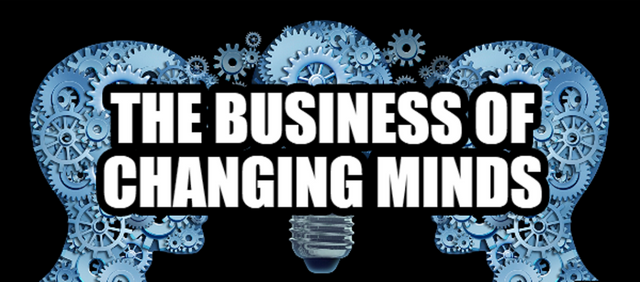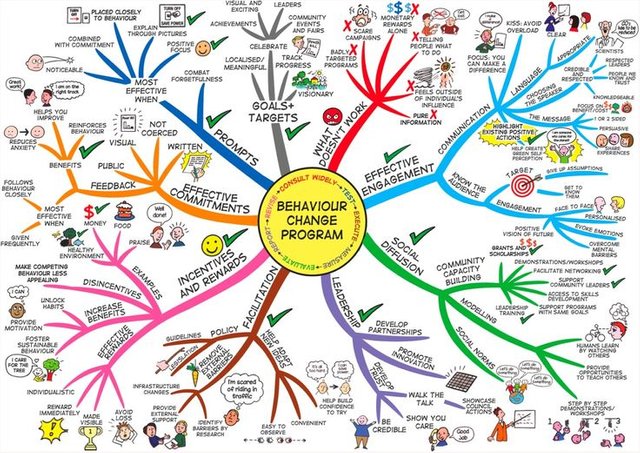The Business of Changing Minds

Person: Hey! Did you know that ____________ and _____________? I was just listening to such-and-such radio show and so-and-so said that __________ and ____________!
Me: Um... I've literally been saying that to you for years.
Person: What? I don't remember you ever telling me that.
Me: *Facepalm*

How many of you have ever had an experience similar to that?
I know a lot of people have.
Three Important Takeaways from that:
#1. Most people don’t accept information based on a consistent, rational, objective, balanced, emotionally-neutral thought process.
When I say things like that I feel like sometimes it comes across as condescending, but it’s really not meant to be. That’s just how human nature works. We all function this way.
One of the biggest factors that people will consciously (or subconsciously) use to determine whether they will accept a piece of information or reject it, is the source that the information is coming from.
Do they like the source?
Is it a source that they agree with on most issues?
Is it a source that makes them feel comfortable and reaffirms a lot of their current beliefs?
Is it a source that they listen to a lot? A source they are familiar with? A source they feel like they can personally relate to?
And the opposite is also true:
Many Times People Will Flat Out Reject Information If It Comes From A
Source They Don’t Like, Even If The Information Is 100% Accurate And True
The point is, you don’t want to always take the direct head-on approach when persuading people. This goes for both 1-on-1 persuasion and mass persuasion.
That’s not to say the direct approach never works, sometimes it does.
But in a lot of cases you want to find ways to indirectly and subliminally deliver your message to the people you’re trying to persuade.
To put it in military terms, these would be considered flanking attacks, or even better, infiltrate the "opponents" camp from within.
Find out what sources your prospect trusts.
Then try to figure out ways to distribute your message via those channels.
Or if you can’t do that, just get as close to that as possible. Distribute your message via channels that are affiliated with the sources they trust.
I'm not talking about being deceptive, I mean if you're trying to reach a certain group - Bernie Sanders supporters for example - find out what websites/blogs/youtube channels/etc they like to consume and see if you can get an article published on one of those blogs, or get an endorsement from one of those youtube channels.
You get the idea.
I View Thoughts And Ideas As Actual Living, Breathing
Organisms That Are Just As Real As Our Physical Bodies
And if you view thoughts as living, breathing organisms – brain viruses that grow within their host and spread from one host to another - you will realize that there is a war of ideas and ideologies going on all around us, all over the world, all the time, with consequences that are just as real, just as tangible, and just as deadly as any real war.
Make no mistake about it – if you’re playing in the world of politics (and I would argue that we all are to one degree or another whether we realize it or not) you are forcing your ideas on other people – no matter how righteous or just you think they are – via the barrel of a gun.
If you could make a physical representation of our thoughts on a map, this is what is actually going on in the mental ether of brainwaves when we wage a war of ideas...

#2. People can and do change their minds about deeply held beliefs, but it’s hard and it usually takes a lot of time.
Often times it won’t happen in a direct conversation, so don’t get frustrated if you feel like you’re not getting anywhere with someone.
People need to do things on their own timeline.
If someone is going to change a deeply held belief system that they’ve had for years or for the majority of their life, they usually want to feel like it was their own idea, not something that they were pressured into.
This is basic sales psychology 101.
People hate to be sold things, but they love to buy.
Do you understand the difference?
People Love Buying Things When They Feel Like It’s
Their Own Idea, Instead Of Being Pressured
Same goes for belief systems.
If you're in the business of changing minds, you have to play the long game.
Every decent salesperson knows the money is in the follow up. If you’ve ever gone through any kind of sales training you’ve probably heard the Rule of 7. A prospect needs to hear a message 7 times (usually in 7 different ways) before they’re ready to buy.
That’s just for a simple transaction involving a consumable product and money.
How many more times would a person need to hear a message in order to change a deeply rooted belief they may have held since childhood?
It can be done, but you gotta have some serious patience.
If you’re in the business of changing minds, don’t expect instantaneous short term results. You need delayed gratification to succeed at this.
When I look at my own currently held belief systems in my own life and I trace back the lineage and archeology of my own thought processes, I can see that it’s taken me, not just years, but decades to reach some of the conclusions that I currently have about some things.
Some of my personal belief systems that I currently have were very hard for me to reach and I was dragged reluctantly, kicking and screaming. It took decades of deep introspection, evaluation of myself, personal growth, research, inspection of evidence, trial and error, outside the box thinking, analysis of different viewpoints, multiple chain reactions of epiphanies and (many times painful) personal experiences... before I was ready and willing to mentally and emotionally accept some of the truths that I currently hold.
And some of the beliefs I currently have I may never have accepted them if someone had simply told me about them or if I had just read about them.
I think some of my current beliefs I may never have reached if it hadn’t been for certain experiences that I actually had to go through in my life before I was able to understand and see a different point of view.
And many of the experiences in my life that have shaped my worldviews are experiences that I have no memory of, things that may have happened when I was a child, things that left mental and emotional imprints on my brain that subconsciously factor into what worldviews I’m likely to gravitate towards or repel away from.
You’re the same way, along with everyone else.
These are things you have to think about if you’re in the business of changing minds.
Helping People Wake Up And Change Their Worldview Is
An Extremely Complex Equation That Requires A Multi-Pronged
Approach On Many Different Levels And Channels
And everyone goes through these changes on a different timeline.
A lot of times in order to change someone’s worldview, you have to go 5, 6, 8, 10 layers deep into their subconscious. In other words, sometimes you have to reverse engineer the chain reaction of belief systems that led them to their current worldview and start back at the beginning by addressing those initial root causes, rather than the current manifestation of those root causes.
Simple, right? :-)

#3. All that being said...
Given what we know about human psychology, given what we know about how humans often evaluate information based on superficial factors like their personal feelings about a given source of information...
We should strive to not only do the opposite ourselves, but help other people do the same so that we can have more productive conversations, learn faster and come up with solutions to problems easier.
In an ideal world, we would all be dedicated to always seeking the truth, rather than staying within our comfort zones.
We Should All Be Constantly Asking Ourselves: Why Do I Believe What I Believe?
Did I come to this conclusion by thoroughly examining all points of view, all available pieces of evidence and as much historical context as possible through a logical, objective and emotionally-neutral thought process?
Am I free to see this thing, this piece of information, for what it really is?
Or...
Are my beliefs emanating from some kind of mixture of internal and external influences that are forcing me to be a certain way in order to be acceptable to myself and to the world around me?
Examples of some internal/external forces would be...
- Social pressure
- Peer approval
- Ego
- The need to be right
- Cultural programming
- Financial needs
- Preconceived ideas
- Habitual patterns
- Avoidance of growth and change because they are often times hard and painful
- Am I trying to impress a certain person or group of people?
- Does this conflict with the way I was raised?
- Does this conflict with what I was taught by my parents, my teachers or other authority figures?
- How many other people believe this? Will I be looked at as a weirdo?
- What will my friends or family think?
- How will this impact my relationships?
- Will it rock the boat at my work place or at home?
- How will this affect my reputation or brand?
- How will this affect my career, my business or my income?
- Will this make me look cool? Will it make me popular or unpopular?
- How will this affect my opportunities in life?
- Will this make me or people around me uncomfortable?
- If I accept this new piece of information will it force me to make changes to my life that I don’t want to make because they’re inconvenient?
- Will this new piece of information cause painful cognitive dissonance that I don’t want to deal with?
- If I accept this new piece of information will it force me to re-examine other belief systems I currently have that I don’t want to take the time to re-examine?
- If I change my position about this issue, will I be forced to eat a lot of crow? Will I have to eat a big serving of humble pie? Will it make me look stupid?
- What books did I read, what movies did I watch, what music did I listen to, what social groups have I been a part of throughout the course of my life that have shaped my current worldviews?
- Where was I born in the world, what society did I grow up in, how did my geographic location affect my beliefs and opinions?
- How much do I have invested in my current worldviews? How much time, money, effort, emotional and mental energy have I invested in building, maintaining and defending my current worldviews? If I accept this new piece of information does that mean that all of my past efforts become a waste?

I don’t think there’s a single person on the planet who can say that 100% or even a majority of their beliefs/worldviews have been shaped purely based on evidence without any of the above factors coming in to play.
Trying to objectively evaluate information by eliminating or reducing the above factors as much as possible is a really big deal and it’s hard.
It’s a lifelong skill that takes deliberate, consistent and conscious effort to practice and master.
Hopefully we can all get to that point where we’ve mastered this skill. But we’re also going to have to accept the fact that every individual/group/society/culture goes through different stages of growth on a different timeline. And that’s why we have to be able to communicate in many different ways using different communication styles over a long period of time to get our message across – directly, indirectly, subliminally, etc.
-------------------------------
If you want to connect with me more, the best way to do so right now is through Facebook: